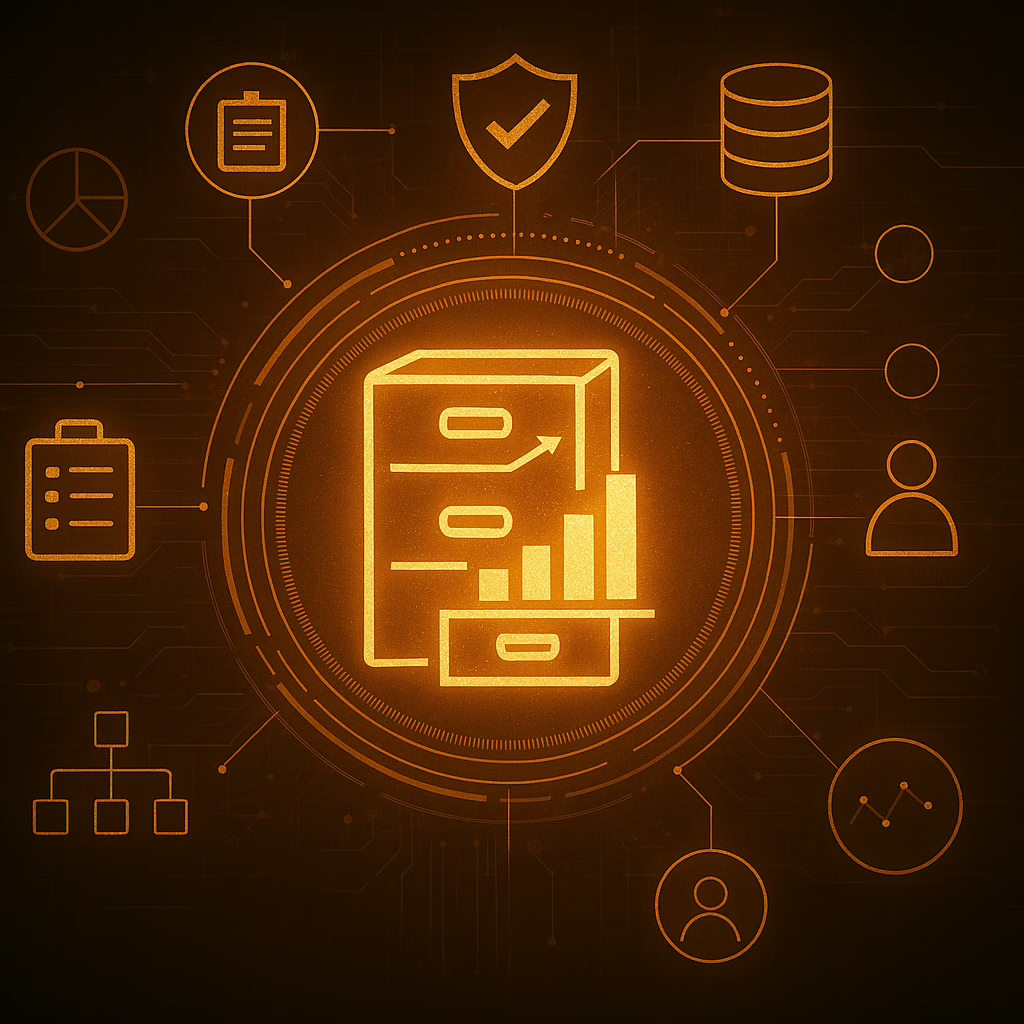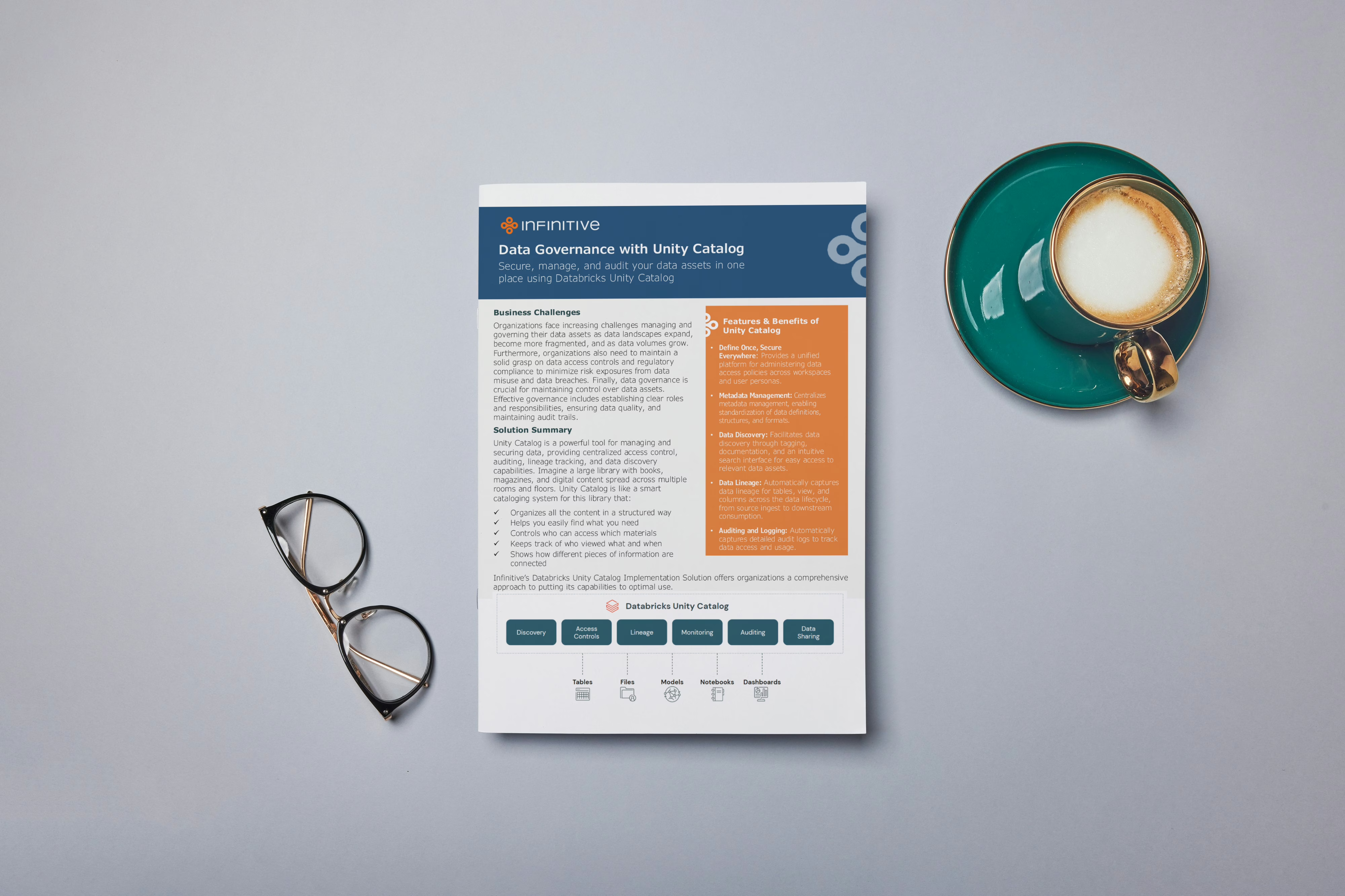Summary
In today’s digital economy, data is at the heart of strategic decision making. Yet as organizations accumulate increasing volumes of structured and unstructured data, managing and governing that data effectively becomes a critical challenge. Fragmented environments, regulatory pressures, and rising data security concerns demand a unified governance approach: one that is scalable, secure, and centralized.
This is where Databricks Unity Catalog steps in as a modern data governance solution designed to simplify and strengthen the way enterprises manage access, security, and data visibility across distributed systems. Infinitive, a Data and AI Consultancy and Databricks partner, has a proven methodology to improve organizations data governance, including migration to Unity Catalog.
The Evolving Landscape of Data Governance
Data governance refers to the framework of policies, processes, standards, and technologies that ensure data is managed as a valuable organizational asset. Effective governance enables organizations to:
- Gain transparency and oversight into data usage
- Enforce security and compliance protocols
- Ensure data integrity and consistency across platforms
- Facilitate collaboration while minimizing risk
As businesses scale and adopt AI and machine learning, governance is no longer optional, it is foundational to building trusted, responsible, and compliant data ecosystems.
However, achieving this is complicated by several common obstacles:
Disconnected Data Systems
Data exists across multiple platforms, data lakes, cloud storage, relational databases, and spans various formats, from structured tables to images, video, and documents. This fragmentation impedes discoverability, inflates storage costs, and results in inefficiencies when analysts and engineers need to locate or validate data.
Varying Access Control Models
Each platform comes with its own method of defining and managing permissions, making it difficult to implement consistent and auditable security controls. This inconsistency often leads to overly permissive or overly restrictive access, undermining security and productivity.
Lack of Lifecycle Visibility
Without full lifecycle monitoring, from data creation to consumption, teams face challenges in tracing errors, understanding downstream impacts of data changes, or ensuring data quality. Missing this visibility adds unnecessary risk and delays in resolving issues.
Barriers to Collaboration
The absence of standardized, cross-platform data sharing mechanisms forces teams to manually replicate data across environments. This duplication can lead to data divergence, increased storage costs, and challenges with version control.
Introducing Unity Catalog: A Unified Data Governance Framework
Unity Catalog offers a centralized governance model for all data and AI assets within the Databricks platform. It consolidates access controls, metadata management, auditing, and data lineage tracking into a single interface.
Rather than governing data separately across workspaces, Unity Catalog acts as a single point of control. This model provides the following core capabilities:
Centralized Access and Permissions
With Unity Catalog, permissions can be defined once and applied uniformly across all Databricks workspaces. This eliminates the need for redundant configurations and reduces the likelihood of human error.
Metadata Standardization
Metadata definitions, schemas, and formats, are maintained centrally, allowing for organization wide consistency. For instance, a field like “Customer ID” may appear in various systems; Unity Catalog ensures it is interpreted and formatted uniformly, regardless of its source.
Comprehensive Data Discovery
Unity Catalog enables data users to easily search for and understand available data assets. They can explore tables, files, dashboards, and machine learning models with clear metadata, usage history, and ownership information. This empowers teams to use data more efficiently without requiring IT assistance.
Audit Logging and Compliance Support
Unity Catalog automatically logs access and data operations, providing critical audit trails for compliance with regulations like GDPR and HIPAA. These logs also aid in internal investigations and security reviews.
Real-Time Data Lineage
Data lineage in Unity Catalog offers visibility into how data flows through systems, from ingestion through transformation to final consumption. It tracks dependencies between tables, notebooks, jobs, and dashboards, helping teams quickly diagnose issues and understand impacts of upstream changes.
Governance Made Easy
Unified data governance starts here. Download the brochure to explore how Unity Catalog can unify control, security, and access across your data landscape.
Infinitive’s Migration Approach
Successfully adopting Unity Catalog requires more than a simple data transfer. It demands a structured, methodical process tailored to each organization’s unique environment. With Infinitive’s Unity Catalog migration approach, we offer not only a structured process customized to your needs, we also work side-by-side with your key personnel throughout the process, so that they learn every step of the way.
Infinitive’s migration approach is divided into distinct phases:
1. Assess & Plan
This initial phase involves stakeholder engagement and a thorough understanding of the organization’s data architecture and governance requirements. We conduct:
- Discovery sessions to capture regulatory, functional, and operational requirements
- Catalog and access reviews to map current state configurations using Infinitive’s automated processes
- Gap analyses to identify areas for consolidation, restructuring, or enhancement
At the end of this phase, we tailor your migration project plan and review with all stakeholders to ensure we’re aligned and ready to move forward.
2. Setup & Design
Before initiating migration, we establish the account-level governance structures required by Unity Catalog. This includes:
- Creating a metastore to serve as the central hub for all data and AI assets
- Defining architecture for data classification, access control, and usage patterns
- Aligning organizational hierarchies with Unity Catalog’s catalog/schema structure
To wrap up this phase, we review documentation, architecture diagrams, and artifacts with key stakeholders to ensure we’re all set to move forward.
3. Develop & Migrate
This phase is focused on the actual migration tasks:
- Catalog and schema creation to organize data assets logically
- Metadata synchronization to carry over existing labels and descriptors
- Table and view upgrades to ensure compatibility with Unity Catalog
Access control mapping to reconfigure user permissions under the new model
4. Test & Validate
Rigorous testing ensures that the migration has preserved data integrity, performance, and security. Validation includes:
- Object and row-level comparisons
- Verification of access and security policies
- Audit logging and compliance checks
Functionality testing for data pipelines, dashboards, and ML models
5. Go Live & Handoff
Following testing, we facilitate production deployment with risk-mitigation measures in place. The final steps include:
- Confirming functionality and performance post-migration
- Delivering documentation and artifacts
Lastly, we wrap up by doing a comprehensive knowledge transfer and handoff to data stewards and administrators, setting teams up to successfully manage and maintain Unity Catalog going forward.

Using Unity Catalog for Data Governance – eBook
Discover real-world strategies, practical templates, and step-by-step guidance to improve data quality, strengthen governance, and align your tech with business goals. Click below to download the eBook and start building a smarter, more unified data ecosystem today.
Realizing the Benefits of Unity Catalog
By transitioning to Unity Catalog, organizations can significantly reduce complexity and enhance data governance maturity. The benefits extend beyond compliance and security:
- Improved data accessibility enables faster decision-making
- Reduced duplication leads to cost savings and cleaner systems
- Stronger data quality builds trust in analytics and AI outcomes
- Enhanced collaboration supports cross-functional innovation
Conclusion
As data ecosystems continue to evolve, the importance of effective governance cannot be overstated. Unity Catalog provides a robust framework to meet the needs of modern data governance, enabling organizations to operate securely, efficiently, and compliantly at scale. Unity Catalog isn’t just a tool, it’s a platform to elevate your entire data strategy.
Infinitive’s deep expertise in data strategy and platform migrations ensures that your journey to Unity Catalog is tailored, thorough, and successful. With Infinitive as your partner, you can transition to Unity Catalog confidently and effectively.
Whether you’re just beginning to explore data governance solutions or are ready to start your migration, we’re here to support every step of the way.
Want to learn more? Contact Infinitive for a discovery session or download our eBook to explore our migration methodology in detail.

